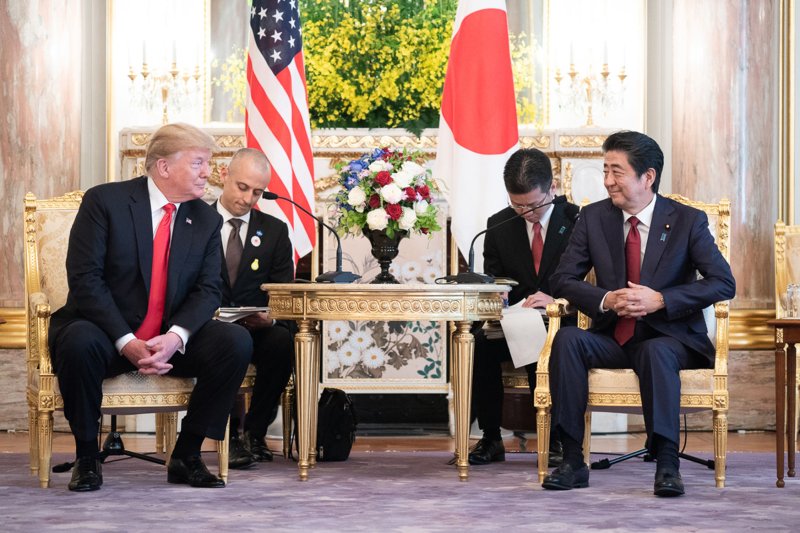President Donald Trump participates in an expanded bilateral meeting with Japan’s Prime Minister Shinzo Abe on May 27 at the Akasaka Palace in Tokyo. Photo by Shealah Craighead/White House |
License Photo
NEW YORK, June 5 (UPI) -- Japanese Prime Minister Shinzo Abe could be trying to please U.S. President Donald Trump with offers to meet with Kim Jong Un without preconditions, as he watches and learns from Trump's example, analysts tell UPI.
Abe, who recently hosted Trump in Tokyo in a summit of pageantry, sumo wrestling and golf, had publicly expressed his desire to meet with Kim unconditionally in May, ahead of the U.S.-Japan summit.
But the move could have been made to signal to the United States that Tokyo is not breaking with Washington on North Korea policy, not because of any realistic expectations Kim would agree to meet with Abe. Japan also remains wary of North Korea after the regime shot several missiles over Japanese territory in 2017.
"Abe probably offered to meet Kim without preconditions because the timing was advantageous to make Japan look like a team player with Trump," said Devin Stewart, senior fellow at the Carnegie Council in New York. "Abe's offer may have looked helpful without risking much."
North Korea has shown little interest in a summit with Japan. Each time Abe has stated his goal of pursuing normalized relations, North Korea has sharply rejected the offer, claiming Japan is cracking down on ethnic Koreans in Japan.
Last week, North Korea said "Japanese reactionaries" are bringing false charges, "like abduction and illegal export," against the General Association of Korean Residents in Japan, or Chongryon. Tokyo has also accused the group, North Korea's de facto embassy in Japan, of "committing violent acts of sabotage," Pyongyang said.
In a separate statement, North Korea's Asia-Pacific Peace Committee said Sunday Abe's "cronies" were as "thick as bear paws" for insisting on a summit despite their anti-North Korea policy. The next day, Japanese Chief Cabinet Secretary Yoshihide Suga said he would not comment on the North Korean statement, and that Abe remains resolved in his aim of "breaking the shell of mutual mistrust" with the North.
Yuki Tatsumi, director of the Japan Program at the Stimson Center in Washington, told UPI it's unlikely Abe and Kim would meet in the near future, although Abe's prospects have improved following the collapse of U.S.-North Korea talks in Vietnam.
"Things are now changing a little, with U.S.-North Korea bilateral negotiations at a stalemate," Tatsumi said, adding inter-Korea dialogue has also "significantly slowed" despite Seoul's best efforts.
"Now Kim Jong Un may have little more incentive than he had before the Hanoi summit in February to meet with Abe. Japan may be somehow able to help Kim Jong Un break the stalemate with the United States."
While the chances of a Japan-North Korea summit are not high for Abe, the prime minister has also proved to be immensely adaptable to changing geopolitics, and of course, to Trump's demands.
During his presidential campaign, Trump accused Japan of not paying its share in the upkeep of U.S. troops in Japan and playing unfairly on trade. Abe has taken on the challenges and built a strong relationship with Trump.
Stewart says the recent Trump-Abe summit was successful because the two countries' interests converged on U.S. weapons and even space security.
"The two leaders talked about some pretty significant things," Stewart said. "The sale of more than 100 F-35s to Japan could transform Japanese power projection with the modification of helicopter carriers to accommodate fixed-wing fighters. They discussed joint moon, Mars and space missions and the importance of space and security."
Japan also avoided a potential confrontation after Trump dismissed the significance of North Korea's most recent short-range missile tests.
Tatsumi said Trump's approach likely irritated the Japanese government but decided to "not let it come to surface as business goes on."
Abe's patience with Trump eventually paid off, Tatsumi said, because he managed to persuade Trump and first lady Melania Trump to meet with the families of Japanese abductees to North Korea.
"The meetings reassure the families he's doing everything he can for them," the analyst said. "They really help build Abe's credibility."















